 Petzlover
Petzlover Miniature Schnauzer is originated from Germany but Wheaten Terrier is originated from Ireland. Miniature Schnauzer may grow 14 cm / 5 inches shorter than Wheaten Terrier. Miniature Schnauzer may weigh 10 kg / 22 pounds lesser than Wheaten Terrier. Miniature Schnauzer may live 3 years more than Wheaten Terrier. Both Miniature Schnauzer and Wheaten Terrier has same litter size. Both Miniature Schnauzer and Wheaten Terrier requires Moderate Maintenance.
Miniature Schnauzer is originated from Germany but Wheaten Terrier is originated from Ireland. Miniature Schnauzer may grow 14 cm / 5 inches shorter than Wheaten Terrier. Miniature Schnauzer may weigh 10 kg / 22 pounds lesser than Wheaten Terrier. Miniature Schnauzer may live 3 years more than Wheaten Terrier. Both Miniature Schnauzer and Wheaten Terrier has same litter size. Both Miniature Schnauzer and Wheaten Terrier requires Moderate Maintenance.
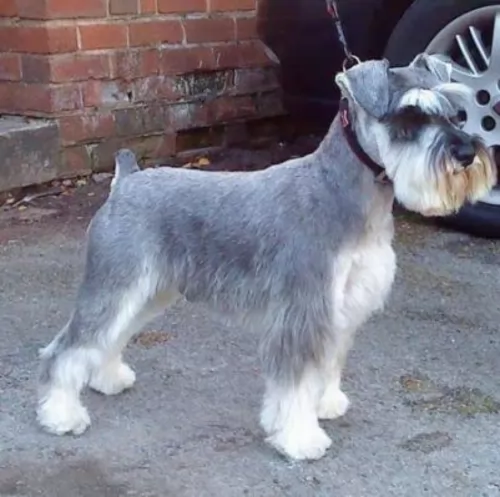 Miniature Schnauzers were first bred in Germany in the 19th century being bred from Affenpinschers and Standard Schnauzers.
Miniature Schnauzers were first bred in Germany in the 19th century being bred from Affenpinschers and Standard Schnauzers.
This dog was always used to control rats on farms, but these days he is more a companion. It is believed that the start of the modern Miniature Schnauzer in the United States was around 1924 when dogs were imported from Germany.
It was in 1933 that the Miniature Schnauzer was recognized by the AKC as a separate breed from the Standard Schnauzer.
 The dog was bred to be a useful dog to have around the farm. He was needed to help with the guarding and herding of livestock and to keep the rat population down.
The dog was bred to be a useful dog to have around the farm. He was needed to help with the guarding and herding of livestock and to keep the rat population down.
This little dog has a long history, but in spite of this, he wasn’t recognized as a breed in his home country by the Irish Kennel Club until 1937.
It was in 1943 that the Wheaten was recognized by the British Kennel Club. They were exported to the United States in the 1940s and recognized by the American Kennel Club in 1973.
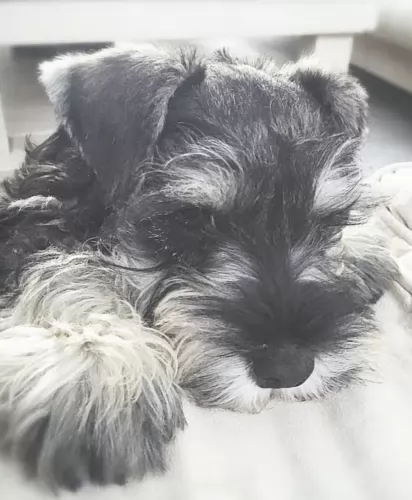 The Miniature Schnauzer is a small dog breed that stands between 30 to 36cm in height and weighs between 5 and 10kg.
The Miniature Schnauzer is a small dog breed that stands between 30 to 36cm in height and weighs between 5 and 10kg.
He has a sturdy body with a dense, wiry coat which most people prefer to have stripped. Because stripping is quite tedious, many of these dog owners prefer to have the coat clipped which actually gives the coat a greyish look to it.
The coat is usually a mix of black and silver. Some people refer to the Miniature Schnauzer as having a salt-and-pepper coat – hairs that are a mix of black and white. The dog has a double coat with the outer coat being wiry and the undercoat being a lot softer.
This is a dog that will need to be groomed frequently to prevent matting. A noticeable feature with these dogs is the rectangular shaped head with alert slanted eyes and bushy eyebrows, mustache and beard. In fact the word ‘Schnauzer’ means beard or muzzle.
The ears have been traditionally cropped but these days they are left and then they tend to be half-erect, half-floppy.
This is a tough little dog, fearless, cheeky, arrogant, alert and also friendly. A draw-card with him is that he is considered as a low-shedder and being hypoallergenic.
They’re very intelligent dogs too and will learn quickly when you give him training and socialization. This is important for a dog like this as he can quickly show you that he is strong willed and independent. Training and socialization makes him much nicer as he becomes more balanced and obedient.
He is full of life and extroverted and you can count on him to join you wherever you are and whatever you’re doing. Whether watching TV, swimming or hiking, he’ll be there and turn every occasion into a festive event. He is a loving, loyal dog, making a splendid pet.
He's protective of his human family and tends to be suspicious of strangers, and this is what makes him such a great watchdog.
 The Wheaten Terrier is a robustly built, medium-sized dog with males and females standing at between 43 to 50cm in height and weighing between 13 to 20kg.
The Wheaten Terrier is a robustly built, medium-sized dog with males and females standing at between 43 to 50cm in height and weighing between 13 to 20kg.
The soft, single coat is a silky texture and a wheaten, gingery color. A bonus is that the coat doesn’t shed much. Puppies are born with darkish coats of a reddish-brown color but the coat lightens significantly as the puppy grows older.
Most Wheaten Terrier owners opt to have the dog professionally groomed. Their tails have always been docked.
Your Wheaten Terrier is a smart dog, albeit headstrong and stubborn. His intelligence makes it easy to have him trained.
They love their human family and aren’t known for any aggression issues. They’re energetic, playful dogs and are sometimes even looked upon as being hyperactive. They’re able to get along well with other dogs and cats in the house. They generally make great family pets.
These dogs are well suited to life in the city as well as the countryside just so long as he gets his daily walks and other forms of exercise.
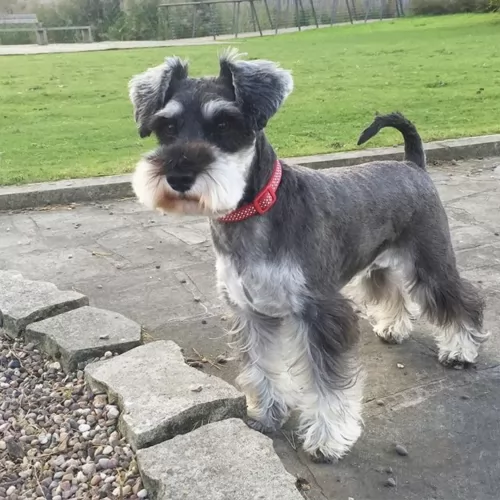 Miniature Schnauzers are such adaptable little dogs, quite happy to make a home with you in the city or in the countryside.
Miniature Schnauzers are such adaptable little dogs, quite happy to make a home with you in the city or in the countryside.
They’re sociable dogs, so just being with his human family wherever they are will suit him well. If he lives in the city however, he will need to have a walk everyday or taken to the park for a run.
He is also a dog that scarcely sheds, so he suits people battling with allergies. With an average life expectancy of 12 to 14 years, if you nurture your Mini Schnauzer and give him the best food and exercise there is, as well as loving him, you’re going to have a loyal and devoted pet.
 The Wheaten Terrier is such a bouncy, lively little dog that he brings joy into any home.
The Wheaten Terrier is such a bouncy, lively little dog that he brings joy into any home.
He is energetic, playful and full of the joys of living but you don’t want to take advantage of his good nature.
Don’t leave him stuck in your back yard but include him in all your family activities. He’s your best friend, providing you with unconditional love that few humans can equal.
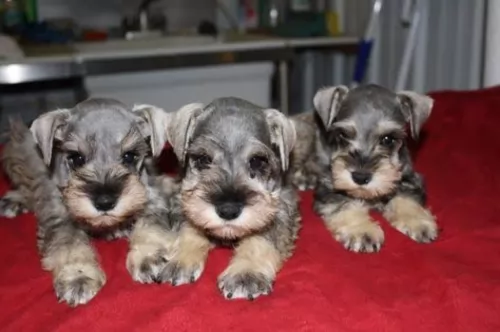 Your Miniature Schnauzer is pretty healthy and he isn’t likely to cost you much in terms of vet fees. There are however some common dog problems that you want to be aware of such as cataracts of the eye and hypothyroidism.
Your Miniature Schnauzer is pretty healthy and he isn’t likely to cost you much in terms of vet fees. There are however some common dog problems that you want to be aware of such as cataracts of the eye and hypothyroidism.
This a a problem in the lens of the eye. The lens should be clear, and when a dog has a cataract, it obscures the vision. The size of the cataract can lead to blindness.
Diabetes in a dog can bring on cataracts as can genetics or damage to the eye from exposure to ultraviolet light. Fortunately, dogs with cataracts can still see. Dogs with old cataracts can have surgery to remove them.
When a dog owner suspects a cataract in their pet’s eye it is best to treat it immediately with anti-inflammatory dog cataract eye drops. Cataracts never go away however without surgery.
The thyroid gland in the neck produces a hormone called thyroxine. It controls metabolism, but with hypothyroidism, enough of the hormone isn’t made. Its a common disease which affects all dog breeds.
Signs of hypothyroidism include hair loss, weight gain, intolerance to cold and a troublesome skin. To have the disease diagnosed, the vet will do a series of blood tests.
 Your Wheaten Terrier is a dog breed that can live healthily with you for a good number of years.
Your Wheaten Terrier is a dog breed that can live healthily with you for a good number of years.
Just like most other dogs, they are prone to some heritable diseases. Perhaps a condition to look out for with this particular dog is protein wasting conditions - protein-losing nephropathy (PLN) and protein-losing enteropathy (PLE).
Both of these diseases are actually fatal but if caught early enough, they can be managed with dietary changes and medication.
Your dog produces proteins known as enzymes, one group being digestive enzymes that help with the breakdown and digestion of food. When your pet battles with malabsorption, digestive enzymes don’t absorb protein and it passes through the large intestine into the faeces. Your dog will have inflammatory bowel disease.
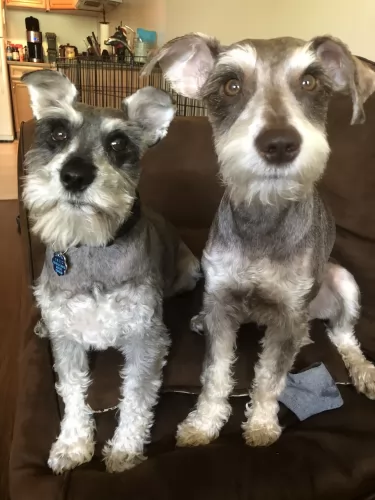 Let’s look at several ways you need to care for your Miniature Schnauzer -
Let’s look at several ways you need to care for your Miniature Schnauzer -
Make sure you have his puppy injections on time. This means knowing which veterinarian you’ll use. Later on if you don’t want to go in for breeding, you will need to have your pet spayed or neutered.
Make sure you have a nice warm, dry spot for your dog to sleep. It can be a cardboard box, or you can buy a dog basket or sleeping platform. Make sure your pet loves it and knows he can retreat to it anytime he wants.
If he goes outside for a few hours, make sure that he has a place to lie in the shade and away from the elements.
Good food promotes good health and longevity. You can feed your pet one of the top quality commercially manufactured foods and give your pet some variety by adding in some boiled chicken, vegetables and brown rice. Some raw meat occasionally can also be excellent for your pet.
 Brush your pet’s coat twice a week to keep it healthy and have him professionally trimmed to keep him looking nice and groomed.
Brush your pet’s coat twice a week to keep it healthy and have him professionally trimmed to keep him looking nice and groomed.
Dental disease is a common problem with dogs, and more specifically small dogs. Dental problems start with tartar build-up on the teeth and then infection of the gums and roots can set in too. The teeth have to be kept in good condition as rotten teeth can have a negative impact on other important body parts like the heart and kidneys.
Have your pet vaccinated against bacterial and viral infections such as rabies and parvo.
Speak to your vet about the many worms and other parasites that can invade your pet’s body.
Provide your Wheaten with the best food there is to encourage good health and longevity. Keep his meals simple and consistent and always go for high-quality foods that are in keeping with your dog’s age, Kibble as well as home-made food are good choices. Never leave your pet without a constant source of fresh, cool water.
Provide your Wheaten Terrier with good exercise. Remember though that these dogs are sensitive to warm temperatures, and you don’t want to have him exercising in hot weather because of the fear of heat stress.